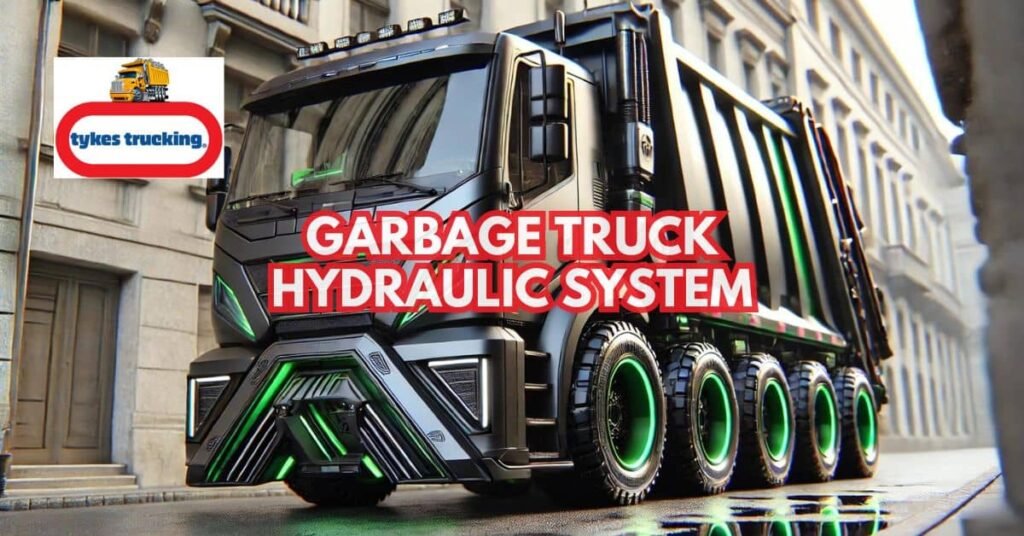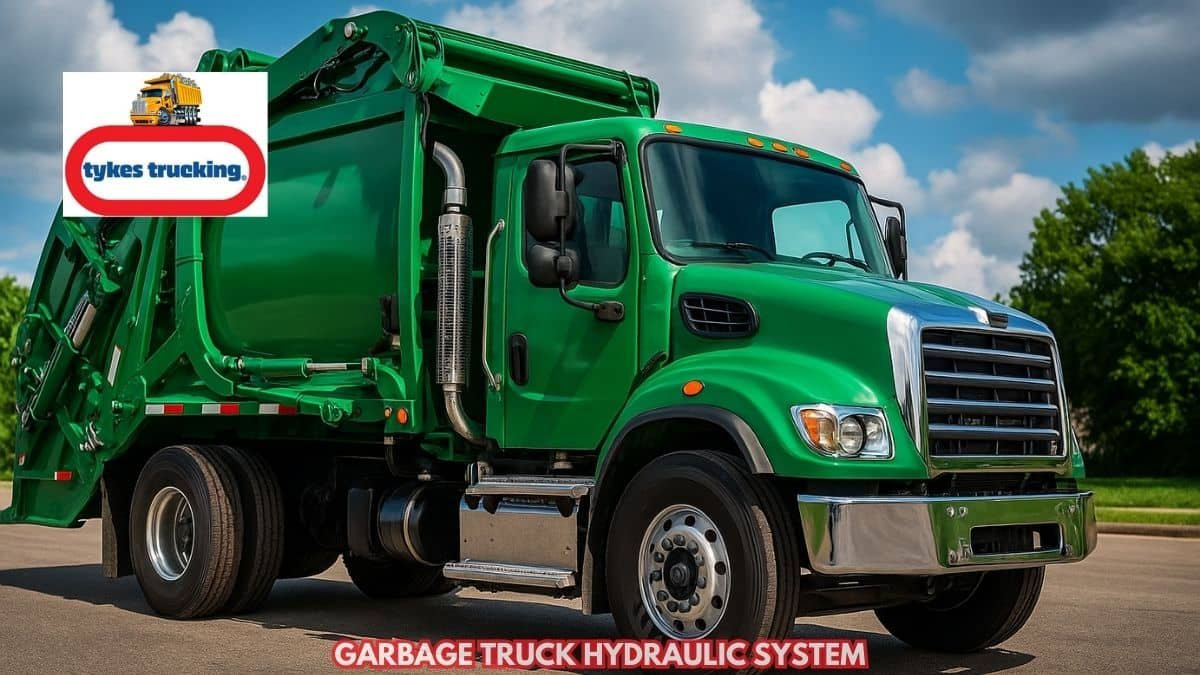The garbage truck hydraulic system is the central technology that makes lifting, compacting, and transporting waste possible.
It uses pressurized fluid to create powerful motion, allowing the truck to handle heavy loads with less effort from the engine.
This system follows Pascal’s law, which means that pressure applied to fluid in one place is evenly shared throughout the system.
Because of this, garbage trucks can operate safely and efficiently even under demanding conditions.
Understanding how the system works provides a clear view of why it is designed this way and why it is essential for reliable waste collection.
1. Key Components of a Garbage Truck Hydraulic System: What You Need to Know
Key components of a garbage truck’s hydraulic system include the hydraulic pump, cylinders, accumulators, hydraulic fluid, and control valves, all working together to power the truck’s operations.
The hydraulic pump generates the pressure needed to move the hydraulic fluid throughout the system, making it the driving force behind the truck’s functions.
Hydraulic cylinders, powered by this fluid, create the mechanical force required to lift heavy waste bins and operate the compactor, which compresses the waste efficiently.
Accumulators play an important supporting role by storing pressurized fluid, absorbing shocks during operation, and providing emergency energy when the pump cannot keep up.
Control valves regulate the flow and direction of the hydraulic fluid, ensuring that each part of the system receives the precise amount of pressure needed for optimal performance.
This precise control is essential for the compactor to work effectively, especially when dealing with large volumes of waste or recycling materials.
Without these well-coordinated components, the truck would be unable to manage the heavy demands of waste collection and recycling processes.
Together, they create a powerful and efficient hydraulic system that is the backbone of modern garbage trucks.
2. How the Hydraulic Pump Powers Your Garbage Truck: A Closer Look
The hydraulic pump is a key component of a garbage truck’s power system, responsible for generating the flow of hydraulic oil that drives the truck’s essential functions.
This pump is usually powered by the truck’s engine through a Power Take-Off (PTO) unit, which transfers mechanical energy from the engine to the pump.
The hydraulic pump operates using either a gear, vane, or piston mechanism, each designed to optimize efficiency and output depending on the truck’s specific requirements.
Once the pump draws hydraulic oil from the reservoir, it pressurizes the oil and sends it through the system to power the cylinders, compactor, and other hydraulic components.
The motor connected to the PTO ensures that the pump operates consistently, allowing the truck to lift, compress, and transport waste with ease.
The efficiency of this process directly affects the truck’s performance, especially when handling heavy loads or working continuously throughout the day.
Regular maintenance of both the hydraulic pump and the hydraulic oil is crucial to prevent wear and ensure that the system remains in top condition for reliable operation.
🚚 Understanding the Different Types of Dump Trucks and Their Uses
3. The Role of Hydraulic Cylinders in Garbage Trucks: Lifting and Compressing Explained
Hydraulic cylinders are the muscles of the garbage truck, translating the energy from hydraulic fluid into mechanical action.
These cylinders extend and retract to lift the waste containers and compress the garbage into the truck’s storage area.
The cylinder’s effectiveness depends on its size, stroke length, and the amount of pressure it can handle.
They must be strong enough to manage heavy loads while also being durable to withstand repeated use.
Without properly functioning hydraulic cylinders, the truck would struggle to perform its basic operations, making them indispensable to the hydraulic system.
🚚 How to Optimize Dump Truck Fuel Consumption Per Hour for Cost Savings
4. Understanding Hydraulic Fluid: How It Keeps the System Running Smoothly
Hydraulic fluid is a critical component in the garbage truck’s hydraulic system, serving multiple functions beyond simply transferring energy.
It acts as a lubricant, reducing friction between moving parts and preventing wear and tear.
Additionally, the fluid helps dissipate heat generated during operation, protecting the system from overheating and potential damage.
The quality and cleanliness of hydraulic fluid are vital; contaminated or degraded fluid can lead to inefficiencies and system failures.
Regular checks and replacements ensure that the hydraulic fluid remains in optimal condition, keeping the system running smoothly and efficiently.
🚚 How to Choose the Right Dump Truck Hauling Services in the Philippines for Your Needs

5. How Control Valves Direct Hydraulic Flow: Managing the Truck’s Movements
Control valves are essential for directing the flow of hydraulic fluid to different parts of the system, allowing the operator to control various functions of the garbage truck.
These valves can open, close, or partially obstruct different pathways to manage the speed, direction, and force of the hydraulic cylinders.
There are several types of control valves, including directional control valves, pressure relief valves, and flow control valves, each serving a specific purpose.
Proper operation of these valves ensures that the truck’s movements are precise, whether it’s lifting a container or compacting waste.
Malfunctioning valves can lead to erratic or unsafe operations, highlighting their importance in the hydraulic system.
🚚 How to Choose the Best Dump Truck Design for Your Hauling Needs
6. How Hydraulic Circuits Shape Garbage Truck Performance
Garbage trucks often use open-center or load-sensing hydraulic circuits to manage power flow.
Open center systems keep fluid moving even when not in use, while load-sensing systems adjust flow based on demand to save energy.
Some trucks also use regenerative cycles that reuse fluid flow to make compaction strokes faster.
Accumulators store extra energy, absorb shocks, and provide backup power if the main pump fails.
The choice of circuit design affects how smoothly the truck responds, how much fuel it uses, and how reliable it is during long shifts.
🚚 How to Choose the Best Trucking Services in Cainta for Your Needs
7. Why Regular Maintenance is Crucial for Your Garbage Truck’s Hydraulic System
Regular maintenance of the hydraulic system is necessary to prevent costly breakdowns and ensure that the garbage truck operates reliably.
This includes routine inspections for leaks, checking the hydraulic fluid levels, and replacing worn-out parts such as seals, hoses, and filters.
Neglecting maintenance can lead to gradual deterioration of the system, resulting in decreased performance, higher fuel consumption, and even complete system failure.
A well-maintained hydraulic system not only extends the life of the truck but also improves safety and efficiency during waste collection operations.
Scheduled maintenance should be a priority to keep the system in top working condition.
🚚 Can Truck Drivers Have Passengers?
8. Common Hydraulic System Problems and How to Fix Them
Several common issues can arise in a garbage truck’s hydraulic system, including leaks, noisy operation, slow or jerky movements, and loss of power.
Leaks are often caused by damaged seals or hoses and can lead to a drop in hydraulic fluid levels, affecting the system’s performance.
Noisy operation may indicate air in the system, which needs to be bled out to restore proper function.
Slow or jerky movements can result from clogged filters or low hydraulic fluid, both of which require immediate attention.
Identifying and fixing these problems promptly is crucial to maintaining the efficiency and longevity of the hydraulic system.
🚚 The Vital Role of Refrigerated Trucking Services
9. How the Hydraulic System Affects Garbage Truck Performance
The performance of a garbage truck is heavily influenced by the efficiency and reliability of its hydraulic system.
A well-functioning system allows the truck to lift heavy loads, compress waste effectively, and operate smoothly throughout its route.
If the hydraulic system is not working optimally, it can lead to slower operation times, increased fuel consumption, and even missed pickups.
The ability of the hydraulic system to perform under varying conditions, such as different load weights and temperatures, directly impacts the truck’s overall productivity.
Thus, a high-performing hydraulic system is essential for maintaining the truck’s efficiency and ensuring timely waste collection.
🚚 Flatbed Truck Ladder Safety Tips for Professionals and DIYers
10. Recent Innovations in Hydraulic Technology: What’s New in Garbage Trucks
Recent advancements in hydraulic technology have brought significant improvements to garbage trucks, making them more efficient and reducing their impact on the environment.
One major innovation is the use of hydraulic pumps that require less energy from the vehicle engine while still producing the pressure needed for heavy lifting.
Electronically controlled hydraulic systems have also become more common, giving operators more precise and reliable control over functions such as lifting bins and running the packer.
These systems can monitor pressure and flow in real time, which not only improves performance but also helps extend the life of parts by preventing excess stress.
Load sensing and regenerative circuits are now widely used to cut fuel use and shorten compaction cycles, allowing the packer to work faster without wasting energy.
Advances in accumulator design have added more stability to the system, helping trucks store extra energy and reduce sudden pressure changes during operation.
Hydraulic fluid technology has also improved, with biodegradable options that reduce harm to the environment while still offering strong lubrication and cooling.
Together, these developments show how hydraulic systems are evolving to make the garbage truck a more efficient vehicle that can meet modern demands for both performance and sustainability.
🚚 Trusted Dump Truck Service for Your Project
11. The Future of Garbage Truck Hydraulic Systems: Trends to Watch
The future of garbage truck hydraulic systems is likely to see further integration with electronic and digital technologies, enhancing both performance and sustainability.
One emerging trend is the use of hybrid systems that combine traditional hydraulics with electric power, reducing fuel consumption and emissions.
Another trend is the development of smart hydraulic systems that use sensors and data analytics to monitor and optimize system performance in real-time.
These innovations are expected to improve the efficiency and reliability of garbage trucks while also addressing environmental concerns.
Staying informed about these trends will be crucial for those involved in waste management and fleet operations.
🚚 Efficient Dump Truck Services for Marikina Projects
💡 Conclusion
Understanding the mechanics of the garbage truck hydraulic system is crucial for anyone involved in waste management.
A thorough knowledge of how the system operates, including its components, functions, and maintenance needs, can lead to better decision-making and more efficient operations.
Proper maintenance and awareness of common issues can prevent costly breakdowns and extend the life of the truck.
Moreover, staying updated on recent innovations and future trends in hydraulic technology can help operators and fleet managers adapt to new challenges and opportunities.
Ultimately, a well-maintained and efficiently operated hydraulic system is key to the successful and sustainable management of waste collection services.
😉 Our Services
At Tykes Trucking Services, we specialize in delivering high-quality aggregates and providing reliable hauling services to meet your needs.
Our team is committed to ensuring timely and efficient deliveries, no matter the size or scope of the project.
We take pride in offering exceptional customer service and competitive rates.
For inquiries or to schedule a service, contact us at 09175435019, through our Facebook page, or via our site’s contact form.
Let Tykes Trucking Services be your trusted partner for all your hauling and aggregate delivery needs.
❓ FAQs
1. What does the garbage truck hydraulic system actually do?
The hydraulic system powers the main movements of the garbage truck.
It makes the lifting of bins, compacting of waste, and unloading of the storage area possible.
Without hydraulics, the truck would not have enough force to handle heavy loads.
It is the main system that allows the truck to do its job safely and efficiently.
2. How often should the hydraulic fluid in a garbage truck be checked?
Hydraulic fluid should be checked during routine maintenance, often on a daily or weekly schedule depending on usage.
Clean and full fluid levels help prevent damage to pumps, cylinders, and valves.
If the fluid is low or dirty, the system may run slowly or fail.
Regular fluid checks are one of the simplest ways to keep the system working properly.
3. What are the signs of hydraulic system problems in a garbage truck?
Common signs include leaks, slow or jerky movements, loud noises, or weak lifting power.
These issues may come from low fluid, clogged filters, or worn seals and hoses.
If not fixed quickly, small problems can lead to bigger failures.
Paying attention to these warning signs helps avoid costly breakdowns.
4. Why are hydraulic circuits important in garbage trucks?
Hydraulic circuits decide how fluid flows through the system and how energy is used.
For example, load-sensing circuits save fuel by adjusting flow to meet demand, while regenerative circuits make compaction cycles faster.
Accumulators in the circuits can store energy or absorb shocks.
The circuit design directly affects truck performance and fuel use.
5. What new technologies are being used in garbage truck hydraulic systems?
New systems use electronic controls to manage pressure and flow more precisely.
Some trucks now use hybrid hydraulics that work with electric power to reduce fuel use.
Biodegradable hydraulic fluids are also becoming common to lessen environmental impact.
These changes make garbage truck hydraulics more efficient, reliable, and eco-friendly.

